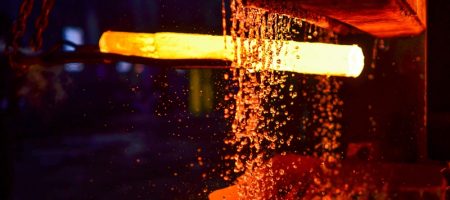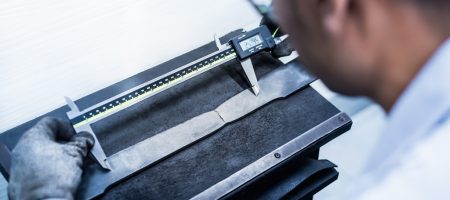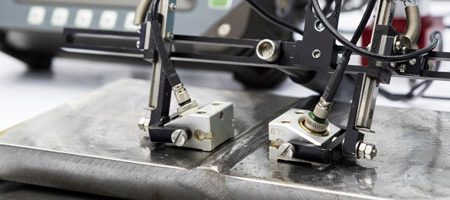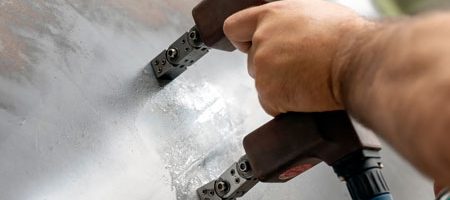
Special Steels offers heat treatment from a single point of contact. We are interested in understanding your steel needs and tailoring a solution that suits your manufacturing operation best.
Request heat treatment when ordering materials from Special Steels and enjoy hassle-free manufacturing at a reasonable price.
The purposes of full annealing may be to refine the grain, induce softness and improve machinability.
The quenching process is done to increase wear resistance, thereby offering a full through-hardened component or a hard surface with a tougher core. The tempering process is carried out after quenching. The purpose of tempering is to minimise the stresses induced by the quenching process, to prevent cracking, and to achieve the desired hardness levels.
This produces harder and stronger steel than full annealing. It may also be used to improve machinability; to modify, refine and homogenise the grain structure; and to improve the response to further hardening operations.
| Symbol | TON f/SQ IN. | Mpa Newton/sq | Hardness (Brinell) |
|---|---|---|---|
| P | 35/45 | 5840/695 | 152/207 |
| Q | 40/50 | 618/772 | 179/229 |
| R | 45/55 | 695/849 | 2010/255 |
| s | 50/60 | 772/926 | 223/277 |
| T | 55/65 | 849/1004 | 248/302 |
| U | 60/70 | 926/1080 | 269/331 |
| V | 65/75 | 1004/1158 | 293/352 |
| W | 70/80 | 1080/1235 | 311/375 |
| X | 75/85 | 1158/1312 | 341/401 |
| Y | 80/90 | 1235/1390 | 363/429 |
| Z | 100MIN. | 1544MIN. | 444MIN. |

Special Steels provides hardness and ultrasonic testing to guarantee its products’ quality further.
Get in touch with our sales department to learn more about our testing and certification services.
Hardness is a characteristic of a material, not a fundamental physical property. It is defined as the resistance to indentation, and it is determined by measuring the permanent depth of the indentation. The testing of rolled, forged bar and rolled plate in both black and machined condition can be done in-house using portable hardness testing equipment or can be sent for testing in a laboratory environment.
Ultrasonic Testing is the non-destructive technology used to test the integrity of the steel, ensuring there are no internal fractures or flaws. Special Steels does this testing on site, as a value-added service to clients. Testing is conducted in house in accordance with ASNT standard ANSI/ASNT CP-105-2011/AMST recommended practise SNT-TC-1A 2011 (up to AQL Level 2).

Special Steels can provide metallurgical laboratory services through our accredited partners.
Get in touch with our sales department to learn more about our metallurgical lab services.
Quantitative chemical analysis is performed to accurately determine the concentration of elements in the material of a given sample.
Mechanical testing reveals the properties of a material when force is applied dynamically or statically. A mechanical test shows whether a material or part is suitable for its intended application by measuring properties such as elasticity, tensile strength, elongation, hardness, fracture toughness, impact resistance, stress rupture and the fatigue limit.
Reclassification material specifications through chemical analysis which is supported by mechanical property testing.
Metallurgical analysis reveals the condition and makeup of steel including grain size, microstructure and cleanliness. These analyses reveal processes performed on the material during manufacture and whether or not the materials meet the required specification(s) to ensure durability in the intended use.

Ultrasonic testing (UT) comprises a range of non-destructive testing (NDT) techniques that send ultrasonic waves through an object or material. These high-frequency sound waves are transmitted into materials to characterise the material or for flaw detection.

Magnetic particle inspection (MPI) is a non-destructive inspection method that provides detection of linear flaws located at or near the surface of ferromagnetic materials. It is viewed primarily as a surface examination method.

Our fleet is a core part of our operations because it enables Special Steels to provide 24-hour logistical solutions and ensure reliable steel deliveries to clients in and around Gauteng.
Logistics become a pleasure because our personal sales representatives make the arrangements for you. No hassles. Just honest value added to great products.
Please speak to our sales team about integrating a logistical solution to optimise operational efficiency.